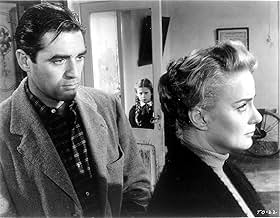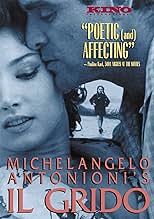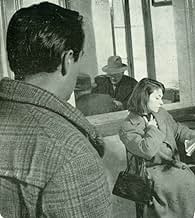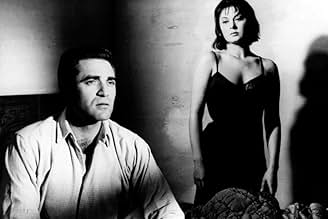PUNTUACIÓN EN IMDb
7,6/10
5,8 mil
TU PUNTUACIÓN
Añade un argumento en tu idiomaA man wanders aimlessly away from his town, away from the woman he loves, emotionally and socially inactive.A man wanders aimlessly away from his town, away from the woman he loves, emotionally and socially inactive.A man wanders aimlessly away from his town, away from the woman he loves, emotionally and socially inactive.
- Dirección
- Guión
- Reparto principal
- Premios
- 3 premios y 2 nominaciones en total
Gabriella Pallotta
- Edera, her sister
- (as Gabriella Pallotti)
Jacqueline Jones
- Andreina
- (as Lyn Shaw)
Pietro Corvelatti
- Fisherman
- (sin acreditar)
Elli Parvo
- Donna Matilda
- (sin acreditar)
Reseñas destacadas
Films like Il Grido are nearly impossible to qualify or calculate on any real scale simply because they do not adhere to conventional rules of filmmaking. Michelangelo Antonioni's existential journey is very episodic in nature as we watch a self-contained man travel away from his lover in search of more fulfilling relationships after she turns down his marriage proposal. What follows may or may not make an emotional impact on the viewer as it is very languid pacing and tediously told. Antonioni fills the screen with endless long shots and long takes of the most desolate, empty and vast areas possible, especially for a country known to be so vibrant and fruitful as Italy. This seems to represent the protagonist's soul, his yearning for some sort of satisfaction that he cannot seem to grab a hold of. Despite the downtrodden mood of the film, it is a captivating journey, exploring the depths and lengths to which humans seek pleasure in any form. Of course, this assumes that pleasure is the right word.
Aldo's way takes him through the northern Italian region he knew in his youth. Gianni di Venanzo's photography is superb, capturing the bleak atmosphere of small towns: houses run down, cheap gas stations, a school in the middle of nowhere. There is nobody like Antonioni for portraying empty spaces leading nowhere.
Aldo is as confused a character as one can find in European cinema. His life with Irma is over-she doesn't love him anymore-but he insists on moving on with his daughter. Elvia and her sex pot sister Edera offer no shelter to this man, who can't afford to bring up a child. He gets lucky, it seems with Virginia and her crazy dad at the gas station, but still he manages to alienate her. The last stop is a rundown shack with a prostitute. The four actresses--Alida Valli, Betsy Blair, Dorian Grey and Lyn Shaw--all play well. Steve Cochran at least has the advantage of a sturdy build even if his acting skills are limited.
If Il grido is not as fine as L'avventura or Le amiche from the early period, it is still very good work.
Aldo is as confused a character as one can find in European cinema. His life with Irma is over-she doesn't love him anymore-but he insists on moving on with his daughter. Elvia and her sex pot sister Edera offer no shelter to this man, who can't afford to bring up a child. He gets lucky, it seems with Virginia and her crazy dad at the gas station, but still he manages to alienate her. The last stop is a rundown shack with a prostitute. The four actresses--Alida Valli, Betsy Blair, Dorian Grey and Lyn Shaw--all play well. Steve Cochran at least has the advantage of a sturdy build even if his acting skills are limited.
If Il grido is not as fine as L'avventura or Le amiche from the early period, it is still very good work.
In the total of Antonioni's films, 'Il grido' (= Italian for 'the outcry') makes an exception: it is entirely set in a worker's environment. Usually Antonioni's actors and actresses perform people who don't earn their living by physical labor.
Produced shortly before Antonioni's famous trio 'La Notte', 'L'eclisse' and 'L'avventura', this film from 1957 clearly shows the theme Antonioni got so famous with: men losing their roots, being dislocated & disoriented by the advancement of technology. Around 1960 this pessimism was very current.
On top of this, 'Il grido' carries every other Antonioni-feature. Fine shooting, while emphasizing on geometries in buildings and landscapes (Antonioni was educated as an architect). First class actors and actresses who seldom laugh and make joy. And, as I already mentioned, a pessimistic theme linked with some grand-scale technical advancement.
Antonioni is renowned as 'the poet of misery'; 'Il grido' is quite in line with this statement.
Produced shortly before Antonioni's famous trio 'La Notte', 'L'eclisse' and 'L'avventura', this film from 1957 clearly shows the theme Antonioni got so famous with: men losing their roots, being dislocated & disoriented by the advancement of technology. Around 1960 this pessimism was very current.
On top of this, 'Il grido' carries every other Antonioni-feature. Fine shooting, while emphasizing on geometries in buildings and landscapes (Antonioni was educated as an architect). First class actors and actresses who seldom laugh and make joy. And, as I already mentioned, a pessimistic theme linked with some grand-scale technical advancement.
Antonioni is renowned as 'the poet of misery'; 'Il grido' is quite in line with this statement.
Known as "The Outcry" in the U.S. A wonderful if disturbing film about alienation and modern society. Not for those who like bouncy, happy films.
The great though relatively forgotten American actor Steve Cochran is near perfect as the worker who finds he cannot communicate, with those he loves, and so begins a downward spiral towards a state of mental disintegration. What is interesting are the Marxist and Freudian overtones that Antonioni puts on the character. The protagonist as the result of his economic position in a capitalist society ( he only has his labour to sell) is uprooted from his community and therefore alienated from his environment, and so becomes alienated from those he loves. The harder he tries the more he withdraws until he perceives he can suffer no more.
Cochran always was very good at playing "heavies" or "playboys", and here he manages to bring both to his underdog character who is strong, brutish and handsome. At the same time he manages to convey the loneliness and vulnerability the character lives through showing that those attributes are not enough to survive.
Antonioni directs with a sure hand a picture of a successful, postwar, industrial Italy where everything is not as easy as it seems. Needless to say the film is in black and white and photographed in grainy neo realist style. The landscapes, in true Antonioni fashion, are bleak, and the loneliness and isolation from others is reflected in the distance between buildings. The leisured pacing, adds to the feeling that life drags on without change.
Antonioni's characters normally, as his films L'eclisse and Red Desert, as with fellow Italian directors Fellini and De Sica during the same period, usually have uncertain futures, as if there is a hidden side to Italy's postwar economic miracle. Here, it's as if the protagonist has a manifest destiny from which there is no redemption.
The great though relatively forgotten American actor Steve Cochran is near perfect as the worker who finds he cannot communicate, with those he loves, and so begins a downward spiral towards a state of mental disintegration. What is interesting are the Marxist and Freudian overtones that Antonioni puts on the character. The protagonist as the result of his economic position in a capitalist society ( he only has his labour to sell) is uprooted from his community and therefore alienated from his environment, and so becomes alienated from those he loves. The harder he tries the more he withdraws until he perceives he can suffer no more.
Cochran always was very good at playing "heavies" or "playboys", and here he manages to bring both to his underdog character who is strong, brutish and handsome. At the same time he manages to convey the loneliness and vulnerability the character lives through showing that those attributes are not enough to survive.
Antonioni directs with a sure hand a picture of a successful, postwar, industrial Italy where everything is not as easy as it seems. Needless to say the film is in black and white and photographed in grainy neo realist style. The landscapes, in true Antonioni fashion, are bleak, and the loneliness and isolation from others is reflected in the distance between buildings. The leisured pacing, adds to the feeling that life drags on without change.
Antonioni's characters normally, as his films L'eclisse and Red Desert, as with fellow Italian directors Fellini and De Sica during the same period, usually have uncertain futures, as if there is a hidden side to Italy's postwar economic miracle. Here, it's as if the protagonist has a manifest destiny from which there is no redemption.
In the Antonioni canon "Il Grido" is often cited as one of his lesser works, superseded by the trilogy that began with "L'Avventura" and even his later English-language films, "Blow Up" and "The Passenger". Granted this remarkable film doesn't quite hit you between the eyes in the way others do but remarkable it is, a grim tale of working-class misery set in a misty, wet Po Valley and concerned, like much of Antonioni's work, with a loss or lack of love.
Perhaps the critics of the time weren't too happy with Antonioni's decision to cast the American Steve Cochran as the brutish anti-hero Aldo. Cochran had to be dubbed as did a number of his co-stars, including Alida Valli and Betsy Blair. In his own country Cochran was never rated as much of an actor but he is superb here as a man deserted by the woman he had hoped to marry, (Valli), and who then takes to the road with his young daughter.
If anything, the film is proof that Antonioni wasn't just a great chronicler of upper and middle-class angst but someone who could deal with the universal themes of loss and grief. It's certainly downbeat. From the outset it's a film that offers no hope for its characters and is probably the director's most pessimistic work. His use of location is, of course, crucial; its bleakness mirrors its characters lack of hope and Cochran's Aldo is one of cinema's great existentialist working-class heroes while, even dubbed as here, both Valli and Blair are excellent and Gianni Di Venanzo's cinematography is superb. This is a film crying out for rediscovery and simply shouldn't be missed.
Perhaps the critics of the time weren't too happy with Antonioni's decision to cast the American Steve Cochran as the brutish anti-hero Aldo. Cochran had to be dubbed as did a number of his co-stars, including Alida Valli and Betsy Blair. In his own country Cochran was never rated as much of an actor but he is superb here as a man deserted by the woman he had hoped to marry, (Valli), and who then takes to the road with his young daughter.
If anything, the film is proof that Antonioni wasn't just a great chronicler of upper and middle-class angst but someone who could deal with the universal themes of loss and grief. It's certainly downbeat. From the outset it's a film that offers no hope for its characters and is probably the director's most pessimistic work. His use of location is, of course, crucial; its bleakness mirrors its characters lack of hope and Cochran's Aldo is one of cinema's great existentialist working-class heroes while, even dubbed as here, both Valli and Blair are excellent and Gianni Di Venanzo's cinematography is superb. This is a film crying out for rediscovery and simply shouldn't be missed.
¿Sabías que...?
- CuriosidadesMichelangelo Antonioni's first collaboration with his future muse and lover, Monica Vitti. Although Vitti doesn't physically appear in the film, she dubbed the Italian lines for Dorian Gray.
- PifiasTodas las entradas contienen spoilers
- ConexionesFeatured in Cinema Paradiso (1988)
Selecciones populares
Inicia sesión para calificar y añadir a tu lista para recibir recomendaciones personalizadas
- How long is Il Grido?Con tecnología de Alexa
Detalles
Taquilla
- Recaudación en Estados Unidos y Canadá
- 16.549 US$
- Fin de semana de estreno en EE. UU. y Canadá
- 6536 US$
- 10 nov 2024
- Recaudación en todo el mundo
- 17.413 US$
- Duración1 hora 56 minutos
- Color
Contribuir a esta página
Sugerir un cambio o añadir el contenido que falta



























